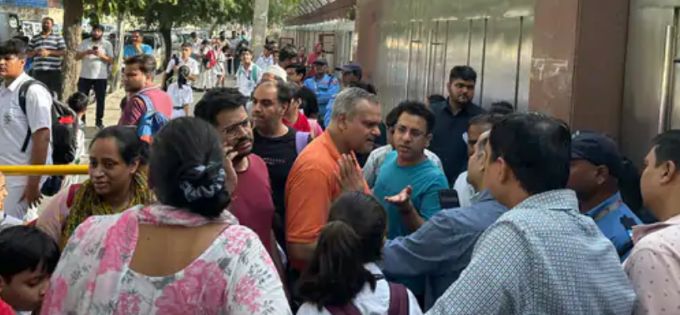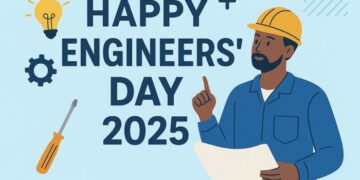The Delhi Public School (DPS) Dwarka case—central to the push for regulating school fees in the capital—has begun to tilt in favor of students and parents, potentially marking a turning point in the long-standing conflict over arbitrary fee hikes in private schools.
In a dramatic turn of events, lawyers for DPS Dwarka withdrew the school’s expulsion order against 31 students—issued for non-payment of increased fees—just minutes before the Delhi High Court was to pronounce its judgment on June 5. The Court took note of the withdrawal and reinstatement of the students, stating, “Since the impugned order(s) whereby the names of 31 children had been struck off the rolls of the school has been withdrawn and the concerned students have been reinstated, the controversy raised in the present application has become moot.”
The school had removed the students from its rolls on May 9 and barred them from entering the premises on May 13, sparking protests from parents who have refused to pay the revised fees without approval from the Directorate of Education (DoE). The DoE intervened on May 15, ordering the immediate reinstatement of the students.
Over 100 parents have challenged the 2025–26 academic session’s fee hike in court, demanding that the school collect only the DoE-approved fee structure. The case has reignited debate around unchecked fee hikes and has lent fresh momentum to regulatory reform.
Court Condemns Use of Force, Public Shaming
In its judgment on June 5, the Delhi High Court expressed strong disapproval of the school’s reported use of “bouncers” to prevent students from entering the premises, calling it “a reprehensible practice” incompatible with the principles of education.
The Court stated:
“This Court is also constrained to express its dismay at the alleged conduct of the petitioner school in engaging ‘bouncers’ to physically block entry of certain students into the school premises. Such a reprehensible practice has no place in an institute of learning. It reflects not only disregard for the dignity of a child but also a fundamental misunderstanding of a school’s role in society.”
The verdict went further, declaring that such coercive practices constitute mental harassment, severely undermining a child’s psychological well-being:
“Public shaming or intimidation of a student on account of financial default not only constitutes mental harassment but also undermines the psychological wellbeing and self-worth of a child… The use of ‘bouncers’ fosters a climate of fear, humiliation and exclusion that is incompatible with the fundamental ethos of a school.”
While acknowledging the need for schools to recover operational costs, the Court emphasized that educational institutions cannot be equated with commercial enterprises and must uphold fiduciary and moral responsibilities toward students. The Court also directed the school to follow due process, including advance notice and opportunity to respond, before striking any student off the rolls in the future.
Delhi Government Fast-Tracks Fee Regulation Law
A day before the court ruling, reports emerged that the Delhi government is expediting its proposed school fee regulation law through an ordinance route ahead of the monsoon session of the Assembly.
The Delhi School Education (Transparency in Fixation and Regulation of Fees) Bill, 2025, which was approved by the Delhi Cabinet on April 29, is currently with the law department for ordinance preparation. A special Assembly session initially planned for mid-May was reportedly delayed due to international diplomatic developments.
The bill proposes the establishment of a three-tier fee regulation committee system at the school, district, and state levels to review and approve fee hikes. Notably, schools will no longer be able to increase fees without prior approval from these bodies.
At the school level, the committee would include:
- Six representatives from the school (including the principal and three teachers),
- Five parent representatives selected by lottery, ensuring inclusion from women and reserved categories,
- One nominee from the DoE.
Fee hikes will be evaluated based on multiple criteria, including the school’s infrastructure, operating costs, educational outcomes, and surplus revenue. Violations could attract penalties ranging from ₹1 lakh to ₹10 lakh. The bill explicitly prohibits coercive practices like expulsion or result-withholding for non-payment of fees.
A History of Legal Tussles and Policy Gaps
The controversy around DPS Dwarka is not new. In 2024, the school similarly expelled 26 students over non-payment of hiked fees. The National Commission for Protection of Child Rights (NCPCR) issued a notice under the Juvenile Justice Act, but the Delhi High Court stayed it while criticizing the school’s approach, stating it treated students like “chattel” and operated like a “money-making machine.”
In 2025, similar actions were repeated, including alleged public humiliation of fee defaulters—students reportedly were denied access to the canteen and washrooms, isolated from peers, and placed under guard. A probe by the District Magistrate (South-West) confirmed these practices, triggering widespread backlash and another show-cause notice from the DoE. The High Court again intervened, ordering all students to be readmitted and directing parents to deposit 50% of the disputed amount until the next hearing.
Political and Legal Crosscurrents
This year’s fee hikes—reportedly up to 40% in some schools—have intensified political sparring. The opposition Aam Aadmi Party (AAP), which had pushed for fee regulation during its previous tenure, accused the ruling Bharatiya Janata Party (BJP) of enabling profiteering by private schools. Former CM and AAP leader Atishi Marlena alleged that the current administration gave schools a free hand in hiking fees.
The education minister Ashish Sood responded by launching a sweeping investigation into 600 private schools and issuing notices to at least 10 institutions.
The broader context includes a long history of legal battles over fee regulation in Delhi. The Delhi School Education Act (DSEA), 1973, laid the groundwork, but compliance has been inconsistent. In the 1980s, schools were allotted DDA land at concessional rates on the condition that they reserve 25% of seats for economically weaker sections (EWS) and obtain prior approval for fee hikes.
A key legal milestone came in 2004, when the Supreme Court, in Modern School vs. Union of India, upheld the DoE’s regulatory authority to prevent profiteering. Subsequent cases, such as Justice for All vs. Govt. of NCT of Delhi, reaffirmed this position. In 2007, the Justice Anil Dev Singh Committee was formed to assess and roll back unjustified fee hikes.
More recently, the DoE issued fee cap and transparency guidelines post-2016 under the AAP administration. Despite this, enforcement remained weak. A 2023 circular mandating prior approval for fee hikes on DDA land was widely ignored. A similar 2024 circular was stayed by the Delhi High Court, emboldening many schools to assert institutional autonomy.
A Turning Point or More Turbulence?
The Delhi Fee Regulation Bill, 2025, if passed, could streamline oversight and reduce litigation by establishing clear criteria and processes for fee determination. However, legal experts caution that the new committee structure could trigger fresh conflicts if not implemented transparently and inclusively.
Interestingly, many private schools have expressed support for the bill—hoping it will provide long-overdue clarity amid rising operational costs and pressures to comply with the National Education Policy (NEP). Parents, on the other hand, see hope in the promise of genuine representation and protection against exploitative practices.
Conclusion
The DPS Dwarka case, now a flashpoint in Delhi’s education policy debate, has underscored the urgent need for transparent and accountable regulation of private school fees. As the Delhi government moves ahead with its legislative response, the outcome will hinge not just on the law’s provisions, but also on its execution—and whether all stakeholders are given a seat at the table.












